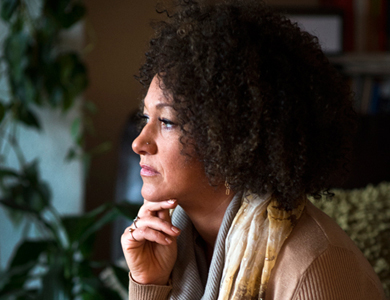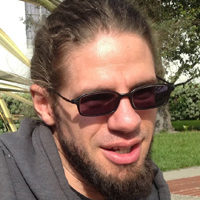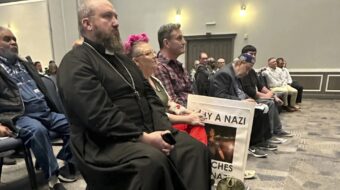
Rachel Dolezal grew up with straight blonde hair and a skin color that matched her European ancestry, but when asked if she considers herself to be African-American, the 37-year-old responded: “I actually don’t like the term African-American, I prefer black. And I would say that if I was asked, I would definitely say that yes, that I do consider myself to be black.”
Today, Dolezal’s skin is a few shades darker than when she grew up. No longer blonde, her hair is now brown and over the past several years, she has sported a variety of traditional African-American hairstyles, including microbraids, dreadlocks and curly hair that she refers to as “the natural look.”
Dolezal’s misrepresentation of her ethnic ancestry most likely aided her employment opportunities. While this may have been illegal, more importantly, she gained economic advantages from racially passing herself off as a person of color. Therefore, she put her own self-interest in front of those she proclaimed to help with her civil rights work.
While there is nothing essentially wrong with adopting another culture, Dolezal’s deception presents some real social dangers that affect African-American communities. This case also raises issues for people of mixed or ethnically blended heritage, because Dolezal chose to pass as a relatively light-skinned African-American woman of mixed descent.
The timing of Dolezal’s racial transition is extremely important. She benefitted from the inherited privileges of whiteness while growing up and through most of her adult life, then she later exploited light-skinned privilege while identifying as an ethnically mixed person.
While the Dolezal story has inspired thousands of jokes and memes that highlight her “multiracial” mimicry, we should also remember that many mixed-heritage people face real struggles around identity.
B(l)ackground
Rachel Dolezal had the advantages of white privilege for roughly the first 30 years of her life before she made a full racial transformation around 2006-2007. Larry and Ruthanne Dolezal are Rachel’s biological parents and have explained that their ethnic background is Czech, German and Swedish with “faint traces” of American Indian that they apparently no longer associate with.
Dolezal grew up racially as a “white person” and over time, developed an affinity for African-American culture, especially in her teens (as do many Euro-American teenagers). When attending college in Mississippi and later at Howard University, Dolezal “had straight, blonde hair,” said a former classmate.
Today, Dolezal teaches Africana Studies at Eastern Washington University “with a specific emphasis on Black women in visual culture” (surprise-EWU has since removed her faculty webpage). She was also head of the NAACP chapter in Spokane, Washington, until she resigned amidst the controversy.
In her NAACP resignation statement, Dolezal said, “I am consistently committed to empowering marginalized voices.” She also spoke of her devotion to “moving the cause of human rights and the Black Liberation Movement along the continuum… into a future of self-determination and empowerment.” These are excellent goals, though “self-determination” means that the people from a particular group will empower themselves.
Dolezal’s statement did not include an apology. It does say that she has “waited in deference” while allowing others to speak “their feelings, beliefs, confusions, and even conclusions-absent the full story.” (We’ve since been getting more of the story.)
Being #BiRachel
Last year, Spokane’s mayor selected Dolezal to help chair the Office of Police Ombudsman Commission. City officials involved in the hiring process say racial background was not a prerequisite for a position, though they sought to achieve ethnic diversity when fielding candidates. On her application for the commission she selected “white, African-American, Native American and two or more races,” for her ethnoracial background.
When Dolezal fashioned her personal appearance as a woman of color and checked “two or more races” on the application, she clearly chose to identify herself as a multiethnic person. She also told people the same, speaking at length about her experience as “a black woman” in the classes she taught and in extended autobiographical interviews (yes, the rabbit hole goes deep).
This is an important part of the Dolezal conversation. She portrays herself as a relatively light-skinned mixed person, which carries it’s own pitfalls and privileges within African-American communities as well as in wider U.S. society.
While people have joked about Dolezal being #BiRachel, many of those who recognize their mixed ancestry aren’t laughing. Dolezal’s racial passing does not help people of blended ethnic heritage who have been questioned over a lifetime about their identity, cultural authenticity, and loyalty to one group or another.
Mixed-heritage people have historically been excluded from full participation in European American society, where racial notions are so rigidly fixed. Though African American, Native American and Latino communities have generally been more accepting of mixed-heritage people, there are still complex histories of colorism within these groups as well.
There’s a general contradiction for many ethnically mixed people who have European heritage in communities of color: one has light-skinned privilege while, at times, they also receive scorn and condemnation from those who resent them for the advantages that light skin and European ancestry bring.
Dolezal may have dealt with this in her thirties as an adult, but she never had to grapple with it in childhood or adolescence. Her European ancestry and light skin tone also give her an advantage that relatively dark-skinned people of mixed-heritage and most African Americans do not have: the ability to pass for “white.”
Passing for Personal Gain
African Americans who were racially light enough to “pass for white” made the decision to do so in order to escape discrimination during the eras of U.S. slavery and Jim Crow segregation. They did this for personal and sometimes family gain.
In previous centuries, people in the U.S. might choose to racially pass for many different reasons, but usually Euro-Americans did not choose to pass as African American since it would drop their social status. In the 21st century, Dolezal found a space where she could excel by passing as a mixed person of partial African ancestry. She simply replaced her previous white privilege with light-skin privilege under the guise of a mixed-heritage person.
Sure, Dolezal has put a new twist on passing, but at its core her racial passing in 2015 is little different than it was 100 years ago: she stood to gain by changing her race in the U.S. Northwest.
Today, many universities, public offices, and political organizations are looking to diversify their personnel in terms of gender and ethnoracial composition. In Spokane, where the African American population is only 1.9%, Dolezal excelled in positions in all three of these areas.
Dolezal also claimed she was pursuing pre-med studies and was “working toward an MD and a residency in trauma surgery.” If she identified as African American on her medical school applications, she would have essentially used blackface to aid her educational and employment opportunities.
“We’re all from the African continent”
Many people find Dolezal’s racially altered appearance disturbing and some are also upset by her affiliation with traditional African-American culture. What’s more offensive is that by professing African ethnic ancestry she lays claim to the same multigenerational struggle of African Americans.
“We’re all from the African continent,” she says.
This is true, but not all of our ancestors chose to immigrate to the U.S. freely or struggled through slavery. Our parents and grandparents, as people of color, could not simply opt out of Jim Crowism. They faced institutional discrimination 24/7 from birth until death. Likewise, many people today cannot simply avoid inadequate schools, discriminatory economic policies, or police and the judicial system.
Perhaps Dolezal feels it’s her right to accept affirmative action because she works against racial inequality and considers herself “to be black.” Such blatant dishonesty delegitimizes her credibility and makes a mockery of her actual civil rights work.
As others have pointed out, Dolezal could still succeed in advancing civil rights causes while being honest about her ethnic background. She can also still identify with African American culture, teach Africana Studies, and fight racial discrimination. There are many people of European descent who already do these things as allies.
Adopting culture, changing race, born into ethnicity
Certainly, part of the reason the Dolezal story has sparked so much commentary and debate is that she convincingly pulled off both a black racial transformation and African American cultural assimilation. Still, she can never alter her ethnic background.
Indeed, everyone in the U.S. has a connection to African American culture under the umbrella of the nation’s history and present. Though Dolezal started out with an admiration of African American culture, she allows herself to move dangerously over into fetishism and donning blackface every time she lies about her ancestry or incorrectly checks the African American box on a job form.
Still, there’s a fine moral line to walk when we judge the legitimacy of anyone’s identity. True, Dolezal laid claim to a history and legacy that do not immediately appear on her family tree, but what if she decided to claim her Native American lineage or identify as a mixed person in this regard?
Better still, what if Rachel Dolezal follows up on her threat to take a DNA test and finds her African roots are closer than we all thought? Many of us would be scrambling to rearrange our arguments for a much more complex debate on both African American and mixed identity.
Reposted by permission of the author.
Photo: Rachel Dolezal poses for a photo in her Spokane, Wash., home, March 2, 2015. (Colin Mulvany/The Spokesman-Review via AP, File)

MOST POPULAR TODAY

High Court essentially bans demonstrations, freedom of assembly in Deep South

U.S. imperialism’s ‘ironclad’ support for Israel increases fascist danger at home

UN warns that Israel is still blocking humanitarian aid to Gaza

Resource wars rage in eastern Congo, but U.S. capitalism only sees investment opportunity







Comments